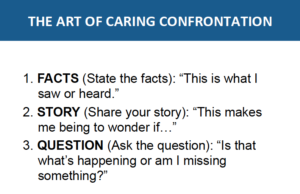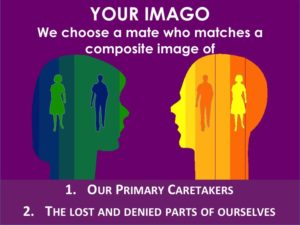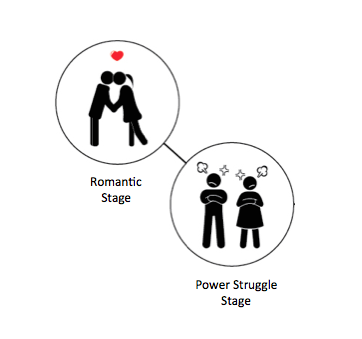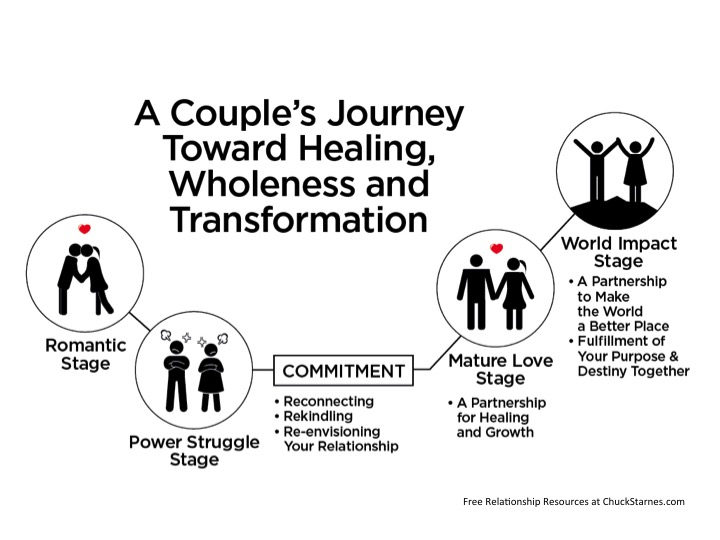What happens to my marriage if I choose to be ‘nice’ rather than honest?
‘¦if I go “silent” rather than confront an issue head on?
Usually there’s an ugly consequence.
Today I’m sharing an amazing tool I call “The Art of Caring Confrontation”.
I always assumed that going silent and being nice is better than blowing up into a raging argument.
I’m not advocating blowing up, but clamming up doesn’t work either.
Why?
Because a healthy relationship requires vulnerability.
And vulnerability takes courage, not just being nice.
I’ve learned that I tend to avoid vulnerability like the plague.
I’d much rather hide what I really feel about something than to confront it in a scary conversation.
Can you relate?
I call it ‘being nice’ rather than being honest.
‘I know how sensitive she is. I don’t want to get a reaction.’
‘Talking about it only brings up the pain of the past.’
‘Sharing how I really feel will hurt his feelings. I don’t want to go there.’
I’m so ‘nice’.
Really?
Sometimes being nice is just a big cover up job for something I’m too afraid to broach.
What a whimp!
It takes COURAGE with a capital C to be vulnerable.
There is a relationship in my family were we have gone silent for 20 years.
There are things that we do not talk about – and have not talked about for two decades. And stuff we will not talk about for another 20 years, unless something changes.
And that big fat elephant shows up and sits there in the room with us every time we’re together. And no one talks about it.
Oh, there are some people who tell me ‘Just say it because it needs to be said!’ If I did that, it would just trigger everyone’s defenses so that no one would really listen.
So, it’s easier to just be ‘nice’.
Why? Because it’s too painful to open old wounds.
Wait a minute! Too painful!?
Too painful compared to what? (Now I’m talking to myself again.)
Have I even considered the price of silence?
Evidently I’m willing to suffer a slow death over 20 years rather than facing the pain of a brief surgery that might start the healing process.
For me that’s been the price of silence. And it’s a heavy price.
OK, whew’¦! I hope there’s some value in that catharsis I just went through.
Now I want to lighten up, and apply this amazing tool to our marriages. It’s a skill you and I can use every day.
I call it’¦
THE ART OF CARING CONFRONTATION
This is how I’m working against that forceful tendency to go silent in a conflict.
This is how I’m learning to say what I need to say in a healthy way that leads to dialogue.
It’s a skill I adapted from the book Crucial Conversations. It’s a way to be honest while being nice.
It goes like this:
1. State the FACTS
Start with the facts because facts are less controversial.
Facts are the basis of the story I’m telling that is creating my emotions.
So start with what happened. ‘This is what I saw or heard.’Facts are what a video camera with sound would have recorded about the event.
2. Tell your STORY
This is my interpretation of the facts. The meaning I’m adding to the facts. The story I’m telling myself about what happened.
Use a sentence stem that goes something like this. ‘This makes me wonder if’¦’
3. Ask the QUESTION
A question that invites dialogue. Something like, ‘Is that what’s happening, or am I missing something?’
Here’s a real life example from Chuck and Sandy’s experience.
CHUCK:
FACTS: ‘You asked me if I’d be willing to tear out the old tomato vines and I said I would. But then you went and did it.’
STORY: ‘That makes me wonder if you don’t trust me to do something when I say I will.’
QUESTION: ‘Is that what you’re thinking?’
At this point I was in control of my emotions because I’m not leading with my ‘story’. Rather than judging Sandy’s intent I used this process to turn on my curiosity.
And this actually made it safe and got us into a healthy dialogue.
SANDY:
‘Sometimes I’m afraid you’ll forget, or you’ll think I’m nagging you. So I went silent and just did it myself.’
CHUCK:
‘That makes sense.’
Then we try to be open to a Behavior Change Request.
SANDY:
‘Is there a request you’d like to make?’
And this is how Dialogue becomes the means to a real change in the relationship.
CHUCK:
‘Yes. It would be help me if you would use your Caring Confrontation skills and talk about it rather going silent and then not trust me. That feels bad.’
SANDY:
‘Can we have a do-over?”
Now Sandy is in the game. She’s not going silent. She’s choosing to be honest rather than ‘nice’. (But honest in a nice way.)
And she’s willing to practice it by going back over it. (We notice our skills get better when we practice them.)
SANDY:
FACTS: ‘Chuck, when I mentioned the dead tomato plants needed to be removed, you said you’d take them out. After a few days I noticed it wasn’t done.’
STORY: ‘That makes me wonder if you forgot or you’d changed your mind. And I started feeling frustrated.’
QUESTION: ‘Can you help me know what’s going on?’
CHUCK:
‘Oh yeah. I was planning to do that this weekend. It did slip my mind, but I thought about it the other day and figured I could do it Saturday morning. Thanks for the nudge and reminder.’
Right on, Chuck and Sandy! Issue resolved!
But…in that first round, why did Sandy go silent?
Fear’¦fear that I would get upset.
But which is harder? Doing the surgery now and having the hard conversation, or letting it fester and become a disease in the relationship?
Can we see how avoiding conflict keeps you in conflict? I’m starting to get it.
Using a skill like The Art of Caring Confrontation opens things up so that we can stay connected and grow and heal together.
Try this out the next time you’re tempted to be ‘nice’ rather than honest.
My goal is to provide free relationship resources delivered to your email inbox every Saturday morning! To receive my weekly blogpost just subscribe below.







